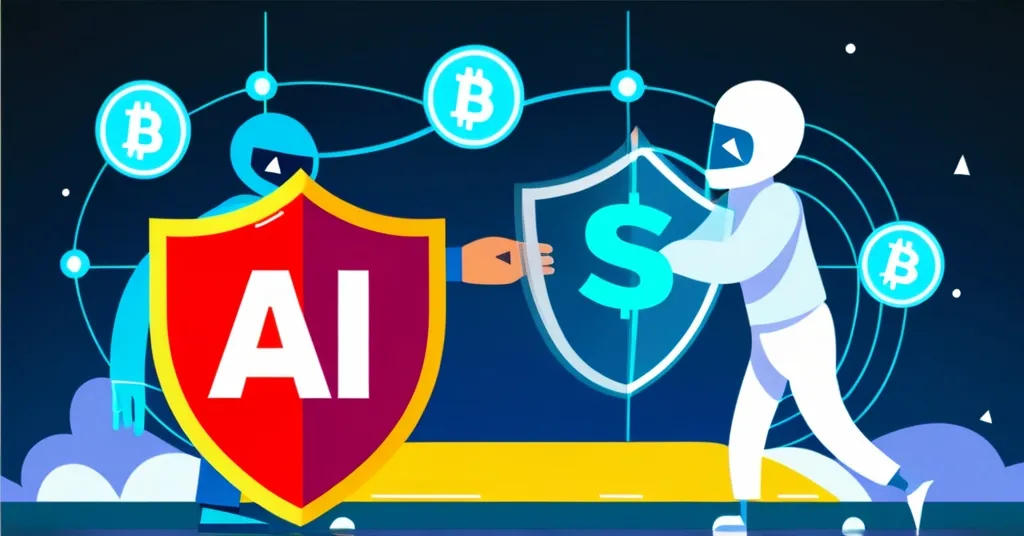Verifiable Credentials: cheqd’s Fight Against AI Scams in Crypto

Verifiable Credentials: The Antidote to AI-Driven Scams in the Crypto World
AI-generated scams are surging in the cryptocurrency space, prompting the need for robust solutions. Verifiable credentials offer a promising way to combat these frauds, and cheqd is at the forefront of this innovative approach.
- AI-driven scams surge in crypto space
- Verifiable credentials as a solution
- cheqd pioneers decentralized identity verification
The Rise of AI Scams
The cryptocurrency world is increasingly plagued by sophisticated scams powered by AI. From romance cons to deepfake fraud, scammers are using advanced tech to trick people out of millions. A recent case in Hong Kong saw fraudsters using AI and deepfakes to swindle victims out of US$4.37 million, as reported by the South China Morning Post. These scams aren’t just about spinning tales; they’re about creating entire fake personas to fleece unsuspecting victims in romance and investment schemes.
Deepfakes, which are AI-generated videos or images that appear real but are fake, are a significant part of this problem. As AI technologies evolve, it becomes harder to tell the real from the fake, making it crucial to find new ways to verify online identities.
cheqd’s Solution
Enter cheqd, a company led by Fraser Edwards, that’s developing what they call “digital proof of identity that can be checked by anyone without a central authority.” This isn’t just a tech buzzword; it’s a practical solution to the growing problem of online fraud. cheqd’s technology uses decentralized, verifiable credentials to help individuals and organizations assert their authenticity without compromising privacy. They leverage tools like trust registries and zero-knowledge proofs to build a secure digital infrastructure.
Fraser Edwards of cheqd emphasizes the urgency of their mission, stating, “The emergence of this technology has sparked widespread debate, raising critical questions: How can individuals and organizations distinguish between real people and artificial representations of real people that mimic human behavior in a realistic way?”
cheqd’s approach is seen as a vanguard in the fight against AI-driven scams. Edwards asserts, “cheqd stands as a vanguard in the fight against the rising tide of AI-driven scams,” highlighting the need for verifiable trust in an era where AI can blur the line between reality and fabrication.
Proof-of-Personhood and DIDs
The concept of proof-of-personhood is central to this battle. It’s about verifying that the person you’re dealing with is indeed a real human, not an AI pretending to be one. Proof-of-personhood uses social signals and cryptographic proofs to ensure an individual’s unique identity, something AI cannot replicate effectively.
Then there are Decentralized Identifiers (DIDs), which are globally recognized identifiers that allow entities to manage their digital identities independently of centralized authorities. DIDs offer a scalable solution for maintaining trust and authenticity online, empowering individuals to control their digital presence without relying on big tech or government oversight.
Challenges and Future Outlook
While cheqd’s technology offers a promising solution, integrating such systems with existing infrastructures can be a nightmare. Ensuring data consistency across decentralized networks is no walk in the park, and there are valid concerns about privacy and the potential for misuse. However, the potential to curb the growing menace of AI-driven scams is too significant to ignore.
Some critics argue that verifiable credentials could lead to a new form of digital surveillance, where every interaction is tracked and verified. Others worry about the complexity and cost of implementing such systems on a large scale. Yet, as Fraser Edwards puts it, “Integrating new tech into old systems can be a nightmare, but it’s a necessary evil if we want to stay ahead of the scammers.”
Key Questions and Takeaways
- What are verifiable credentials and how do they help combat AI-driven scams?
Verifiable credentials are digital attestations that can be issued and verified in a decentralized manner, helping to combat AI-driven scams by providing a reliable way to confirm the authenticity of online identities.
- How does cheqd’s technology work to establish trust in digital spaces?
cheqd’s technology leverages decentralized, verifiable credentials to enable individuals and organizations to assert authenticity without compromising privacy, using tools like trust registries and zero-knowledge proofs to build a secure digital infrastructure.
- What is proof-of-personhood and why is it important in the context of AI-generated content?
Proof-of-personhood is crucial for verifying unique human identities in an AI-driven world, using social signals and cryptographic proofs to ensure that an individual is indeed a real person, which AI cannot replicate effectively.
- How do Decentralized Identifiers (DIDs) function and what role do they play in digital identity management?
Decentralized Identifiers (DIDs) are globally recognized identifiers that allow entities to manage their digital identities independently of centralized authorities, offering a scalable solution for maintaining trust and authenticity online.
- What are the challenges in distinguishing between human and AI-generated content, and how can they be addressed?
Challenges in distinguishing between human and AI-generated content arise as AI technologies become more sophisticated. These can be addressed through robust digital verification mechanisms like DIDs and verifiable credentials, which provide a framework for establishing trust in digital interactions.
In a world where AI can fake it better than most reality TV stars, we need a digital lie detector. Verifiable credentials are not just a nice-to-have; they’re a must-have for the crypto community. They’re the armor we need to shield ourselves from increasingly sophisticated scams powered by AI. And while cheqd is leading the charge, the journey to a scam-free crypto space is far from over. But with innovation and a bit of healthy skepticism, we’re on the right path.



